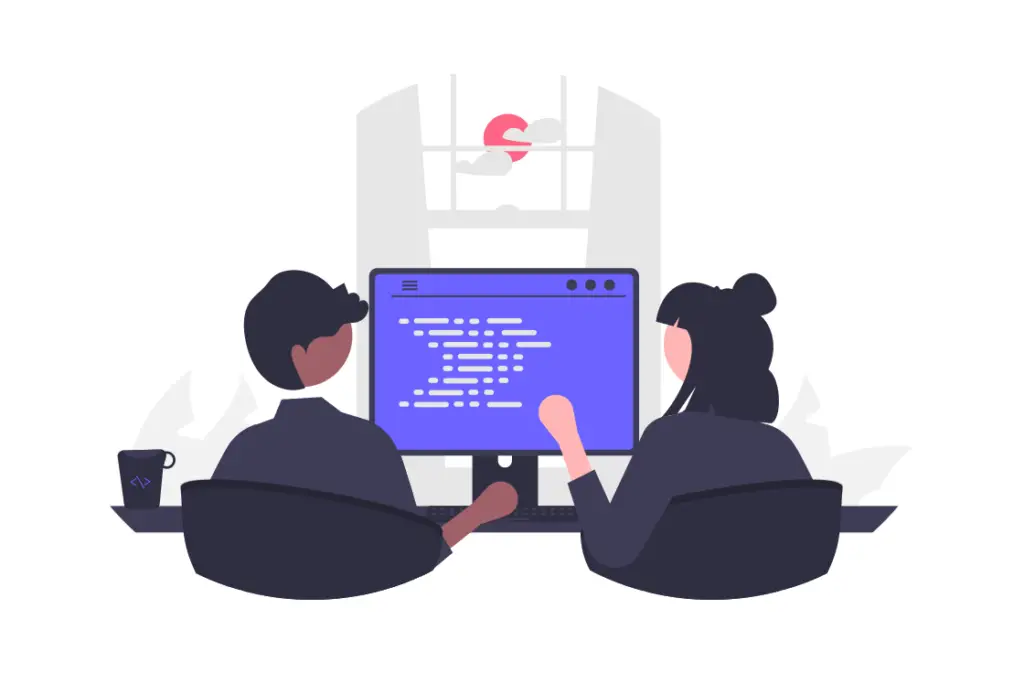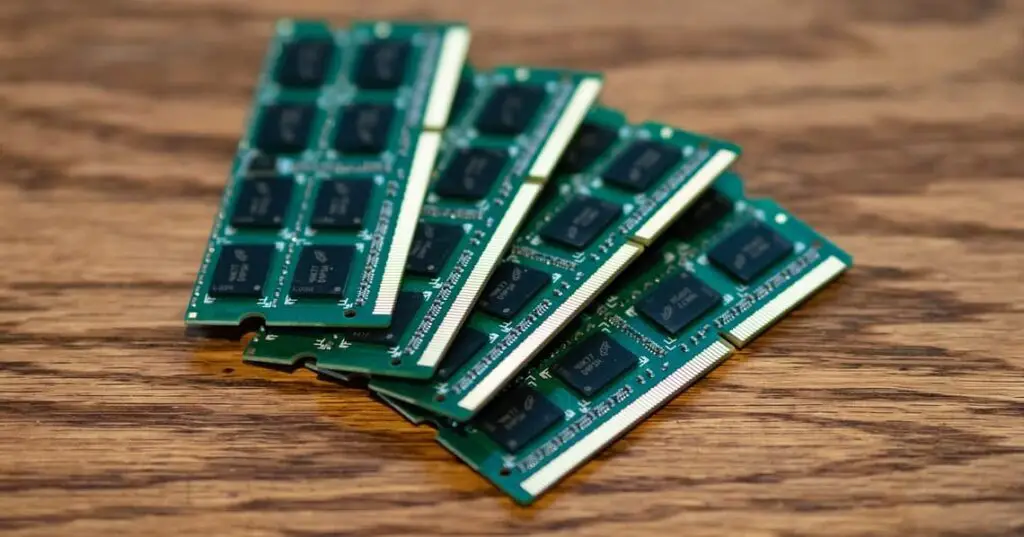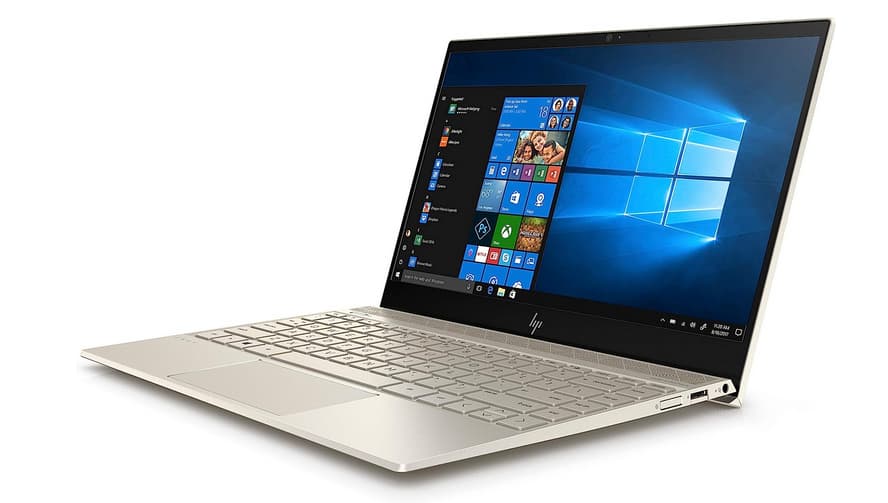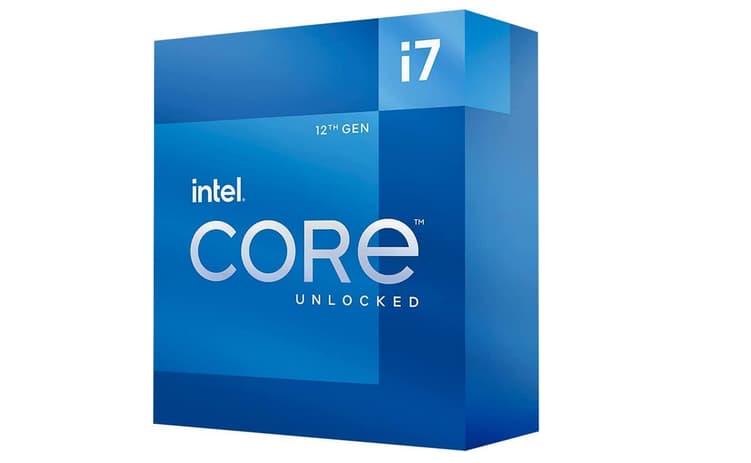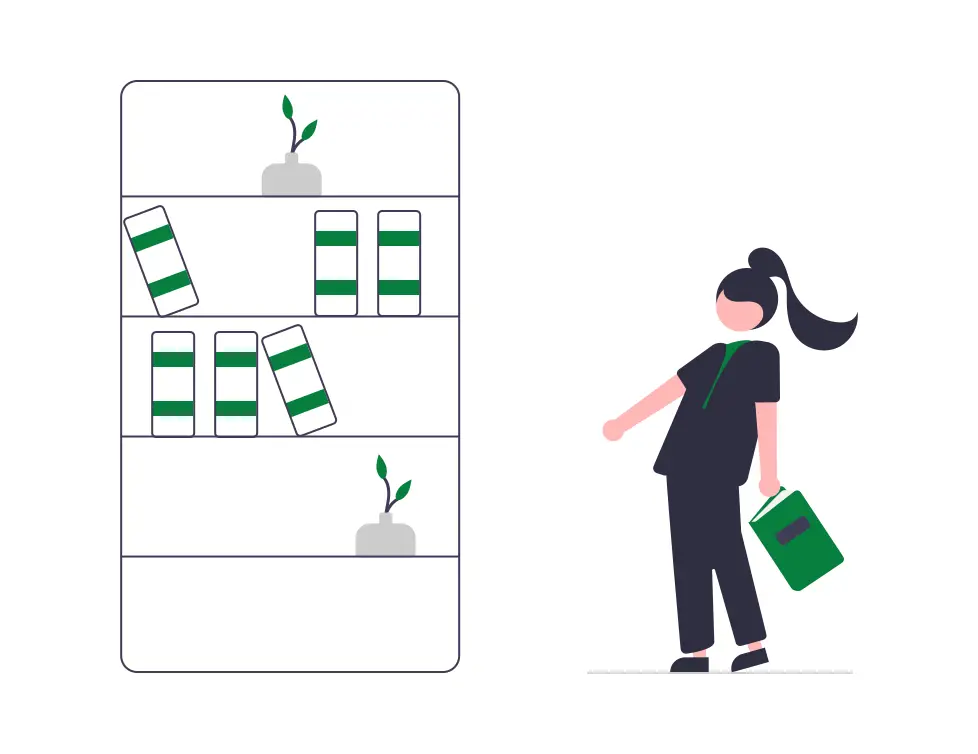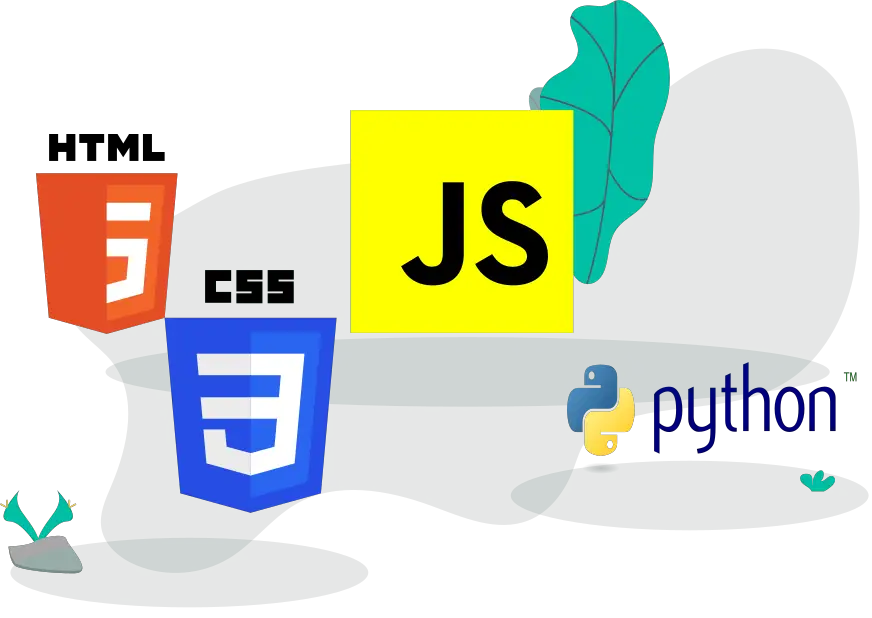In the realm of software engineering, the choice of a reliable and efficient programming device is paramount to success.
Among the plethora of options available, MacBooks have emerged as a popular choice among coders.
But what is it about Macs that makes them the preferred choice for software engineers?
This article delves into the reasons behind this phenomenon, exploring the unique features and advantages that MacBooks offer to those in the coding community.
By understanding the appeal of MacBooks, we can gain valuable insights into why coders gravitate towards these sleek and powerful machines.
So, let’s unravel the mystery and shed light on the question:
Why do coders use Macs?
Coders use Macs for their reliability, Unix-based system, development ecosystem, user experience, and design. MacBooks provide a stable operating system, seamless hardware-software integration, and a Unix-like environment, making them ideal for coding.
The availability of tools like Xcode, SDKs, and frameworks enhances the development process.
Macs offer an intuitive interface, consistent user experience, and support for iOS development.
Programmers embrace Macs for their versatility, ease of use, and the opportunities they provide to create innovative software solutions.
Software engineers choose Macs primarily for their reliability and performance.
MacBooks are known for their stable operating system, macOS, which provides a smooth and consistent experience for coding.
Unlike some other platforms, Macs are designed and optimized for the hardware they run on, resulting in better performance and fewer compatibility issues.
Another significant advantage of Macs is their Unix-based system.
Unix-like environments are highly valued by coders due to their command-line tools and development capabilities.
Macs offer a built-in Terminal and support for powerful Unix commands, making tasks such as compiling code, managing packages, and working with version control systems more efficient.
Let’s look at reasons as to why a a MacBook laptop may be the right choice for you. What do Apple MacBooks have that make them ideal for programming.
1. Developing Apple products and apps
As a software engineer, owning a Macbook opens doors to creating software specifically tailored for Apple’s diverse ecosystem, including iOS, macOS, watchOS, and more.
This unique opportunity allows programmers to tap into a massive market of Apple users and showcase their skills and creativity.
Let’s explore how Macs facilitate this endeavor and provide a competitive advantage in software engineering.
First and foremost, MacBooks come preloaded with Xcode, Apple’s powerful integrated development environment (IDE).
Xcode offers a comprehensive suite of tools, including a code editor, debugging capabilities, and a simulator for testing iOS and macOS apps.
This built-in support makes it seamless for programmers to jump into Apple software development without the need for additional installations or configurations.
Furthermore, Macs provide a unified development experience.
The familiarity and consistency of working with macOS on a Macbook create a smooth transition between coding, testing, and deploying Apple products and apps.
The ability to leverage the same development environment across multiple Apple platforms saves time and effort, allowing software engineers to focus on refining their skills and delivering high-quality software.
Many programmers appreciate the simplicity and elegance of Apple’s development frameworks, such as UIKit and SwiftUI, which facilitate the creation of visually appealing and user-friendly apps.
The integration of hardware and software on MacBooks ensures smooth performance during app development and testing.
Moreover, Apple’s App Store provides a thriving marketplace for software engineers to distribute their apps and reach millions of users worldwide.
By developing apps for Apple devices, programmers can monetize their creations through in-app purchases, subscriptions, or upfront sales.
The revenue potential and exposure on the App Store make Macs a valuable tool for software engineers looking to turn their coding skills into successful business ventures.
Macs present a unique opportunity for programmers and coders to develop Apple products and apps.
With the robust support of Xcode, a unified development experience, and access to the vast market of Apple users, software engineers can leverage their skills to create impactful software solutions.
The seamless integration of hardware and software, combined with the potential for monetization and exposure on the App Store, make MacBooks an ideal choice for software engineering professionals looking to excel in Apple software development.
2. You can develop Android apps on Macs too
Another benefit of using Macs for coders is the ability to develop Android apps.
While Macs are renowned for their seamless integration with Apple’s ecosystem, they also provide a robust environment for Android development.
This versatility allows software engineers to explore both major mobile platforms and tap into a broader user base.
Let’s delve into how Macs facilitate Android app development and the advantages they offer to coders in this realm.
To develop Android apps on a Mac, programmers can utilize Android Studio, the official IDE for Android development.
Android Studio offers a comprehensive suite of tools, including a code editor, debugging capabilities, and an emulator for testing Android apps.
Macs seamlessly support Android Studio, ensuring a smooth and efficient development experience for coders.
Macs also provide an advantage when it comes to deploying and testing Android apps on physical devices.
Android Studio, running on a Macbook, easily integrates with various Android devices for debugging purposes.
This compatibility eliminates the need for additional configurations or workarounds, enabling programmers to streamline their testing processes.
Furthermore, Macs offer a Unix-like environment, which is highly valued in Android development.
The command-line tools and development capabilities available on Macs make tasks such as building, debugging, and managing Android projects more efficient.
Coders can leverage their familiarity with Unix-based systems to enhance their productivity and effectively utilize the powerful tools available for Android development.
As a programmer, I appreciate the stability and performance of Macs when running resource-intensive tasks in Android Studio.
The reliable hardware and optimized operating system contribute to a smooth development experience, allowing me to focus on writing clean and efficient code.
Using a Mac for Android development offers the advantage of a unified development environment.
I can seamlessly switch between Android and iOS development, as Macs support both platforms.
This versatility enables programmers to explore cross-platform development, leverage shared codebases, and potentially save time and effort when building applications for multiple platforms.
3. Macbooks are known to be very reliable in performance
One of the significant advantages of using MacBooks for coders is their renowned reliability in performance.
MacBooks are known for their ability to deliver consistent and stable performance, which is crucial for software engineers who rely on their machines for intensive coding tasks.
This reliability can be attributed to the stable operating system (OS X) and the seamless integration of hardware and software on Macs.
Let’s explore how these factors contribute to the exceptional performance and dependability of MacBooks for coders.
Firstly, MacBooks operate on a stable and robust operating system known as macOS (previously known as OS X).
This operating system is designed and optimized specifically for Apple’s hardware, ensuring a smooth and efficient user experience.
The stability of macOS translates into reliable performance for software engineers, as it minimizes crashes, system errors, and unexpected interruptions during coding sessions.
With fewer disruptions, coders can maintain their focus and productivity, resulting in efficient software development processes.
Secondly, MacBooks are known for their seamless integration of hardware and software.
Apple designs both the hardware and software components of their machines, allowing for a tightly integrated ecosystem.
This integration ensures that MacBooks are optimized to work flawlessly with the macOS operating system, maximizing performance and efficiency.
By controlling both the hardware and software aspects, Apple can fine-tune the components to work in harmony, resulting in a reliable and responsive computing experience.
The reliability of MacBooks in performance is further accentuated by their quality build and meticulous attention to detail.
Apple’s commitment to craftsmanship and stringent quality control measures contributes to the durability and longevity of their products.
MacBooks are built using high-quality materials and undergo rigorous testing, ensuring that they can withstand the demands of software engineering tasks over an extended period.
Many software engineers appreciate the consistent performance and responsiveness of Macs, even when handling resource-intensive tasks such as compiling large codebases or running complex simulations.
This reliability allows coders to work with confidence, knowing that their machines can handle their demanding programming needs without compromising performance or efficiency.
MacBooks are highly regarded for their reliability in performance, making them an excellent choice for coders.
The stable operating system (macOS) and seamless integration of hardware and software on Macs contribute to their exceptional performance and dependability.
4. Macbooks are very stable
MacBooks are known for their reliable and consistent performance, providing a stable computing environment for software engineers.
This stability can be attributed to various factors, including the robust macOS operating system, seamless hardware-software integration, and Apple’s meticulous quality control measures.
The unified nature of MacBooks eliminates many of the hardware-related instabilities that can arise in other systems, providing a stable and reliable platform for software engineering tasks.
Apple’s rigorous testing and quality assurance processes ensure that the operating system is reliable and delivers a seamless user experience.
This stability allows coders to work on their projects without worrying about sudden system failures or unexpected interruptions, resulting in uninterrupted coding sessions and increased productivity.
5. Macs use Unix-based systems, which are more difficult to hack/exploit
One of the significant opportunities that Macs present to programmers and coders is their Unix-based system, which inherently provides enhanced security measures and makes them more difficult to hack or exploit.
This aspect is particularly relevant to software engineering, where data protection and safeguarding sensitive information are of paramount importance.
Unix-like operating systems, including macOS, have a long-standing reputation for robust security practices.
MacBooks benefit from the security features inherited from Unix, making them inherently more resistant to hacking attempts and exploits.
This added layer of security offers peace of mind to software engineers, allowing them to focus on coding and developing software without constantly worrying about potential security breaches.
The Unix-based system on MacBooks provides several security advantages for coders.
Firstly, Macs have a strong user permission model that limits the actions and access levels of various software processes.
This prevents malicious code from executing unauthorized actions, reducing the risk of system compromise.
Additionally, MacBooks include features like Gatekeeper, which ensures that only trusted and digitally signed applications are allowed to run on the system by default.
This helps prevent the installation and execution of potentially harmful or malicious software.
ASLR randomizes the memory addresses of system components, making it harder for hackers to predict memory locations and launch successful attacks.
DEP prevents the execution of code from non-executable memory regions, mitigating the risk of buffer overflow and similar exploits.
The robust security reputation of MacBooks is not just theoretical; it has practical implications for software engineers.
For example, when developing software for clients or working on projects involving sensitive data, using a MacBook can be an advantage.
It provides an added layer of trust and reassurance to clients that their information is being handled with utmost care and security.
6. MacOS Provides the Best User Experience: No system crashes, smooth app execution, you will love the speed too
Macs present a unique opportunity to programmers and coders through the exceptional user experience offered by macOS.
With a focus on software engineering, MacBooks provide a reliable and smooth environment for developing and executing applications.
One of the standout features of macOS is its intuitive interface and ease of use.
MacBooks are designed with software engineering in mind, providing a clean and user-friendly interface that enhances productivity.
The well-designed graphical user interface (GUI) enables programmers to navigate seamlessly through various tools, libraries, and development environments, making the coding process more efficient.
In addition to the intuitive interface, Macs offer a consistent user experience across devices, including iOS development.
Apple’s ecosystem allows developers to create applications for both macOS and iOS platforms, ensuring a seamless transition between devices.
This coherence is especially valuable for software engineers engaged in cross-platform development or those focusing on iOS app development.
With a Mac, programmers can develop, test, and debug their iOS applications using the same familiar interface and tools, streamlining the development workflow.
One of the key advantages of macOS is its stability.
MacBooks are known for their reliable performance, reducing the likelihood of system crashes and software failures.
This stability is crucial for software engineers, as it allows them to work without interruptions and ensures the integrity of their code.
Macs are engineered to provide a robust and dependable environment for coding, enabling programmers to focus on their projects rather than troubleshooting technical issues.
Smooth app execution is another noteworthy benefit of macOS.
MacBooks are optimized to deliver excellent performance, allowing applications to run smoothly and efficiently.
This optimizes the coding experience by minimizing lag and enhancing the responsiveness of development tools and integrated development environments (IDEs).
The fast and responsive nature of Macs ensures that programmers can compile, test, and run their code swiftly, leading to increased productivity and a more enjoyable coding experience.
When I am using a MacBook, I always appreciate the reliability and smoothness of MacBooks, allowing me to focus on writing high-quality code without interruptions caused by system crashes or sluggishness.
7. Mac provides powerful development ecosystem with tools such as Xcode
Other opportunities that Macs present to programmers and coders is the powerful development ecosystem they offer, prominently highlighted by the inclusion of Xcode, Apple’s integrated development environment (IDE).
Xcode provides an intuitive and feature-rich environment for coding, making it a go-to choice for developers.
Its interface facilitates efficient code editing, debugging, and project management, streamlining the software development workflow.
With a robust set of integrated tools, such as Interface Builder for designing user interfaces and Instruments for performance analysis, Xcode empowers programmers to build high-quality applications.
Moreover, Macs boast an extensive collection of software development kits (SDKs) and frameworks, adding further depth to the development ecosystem.
One of the notable opportunities that Macs present to programmers and coders is the integration of Swift, Apple’s modern and powerful programming language, within the development ecosystem.
Swift has gained significant popularity among software engineers due to its ease of use, performance, and safety features.
The inclusion of Swift as a core part of the Mac development ecosystem offers several benefits.
Firstly, Swift incorporates modern language features that make it more approachable and intuitive, particularly for developers transitioning from other programming languages.
Its concise syntax and readable code structure facilitate rapid prototyping and experimentation.
Swift also benefits from extensive standard libraries and frameworks that simplify common programming tasks.
For example, the Foundation framework provides essential functionality for working with strings, collections, file I/O, networking, and more.
Overall, the integration of Swift within the Mac development ecosystem presents programmers with a powerful and modern programming language tailored for Apple’s platforms.
8. Macs run on Unix-based system that provides access to tools like the Terminal
Another significant opportunity that Macs present to programmers and coders is their ability to run on a Unix-based system, providing access to powerful tools like the Terminal.
The Terminal, a command-line interface available on Macs, empowers programmers with a wide array of command-line tools and development capabilities.
The Terminal allows direct interaction with the underlying system, providing developers with flexibility and control over their coding tasks.
Command-line tools enable tasks such as compiling code, managing packages, and working with version control systems, enhancing productivity and efficiency.
For software engineers, the availability of the Terminal on MacBooks opens up a world of possibilities.
They can leverage a rich set of command-line tools to streamline their workflow, automate repetitive tasks, and customize their coding environment to suit their specific needs.
The Terminal also encourages exploration and learning, as developers delve into the command line and uncover new possibilities.
Linus Torvalds Praises Macbook Air as Revolutionary Choice for Programmers Seeking Silence and Portability
Linux creator Linus Torvalds discusses his admiration for the Macbook Air’s design and functionality, highlighting its thin and light form factor, silent operation, and quality performance.
The renowned software engineer and Linux creator Linus Torvalds expresses his admiration for the Macbook Air and why it has become a favored option among programmers.
Torvalds praises the Macbook Air’s emphasis on quiet operation, sleek design, and exceptional performance.
He highlights the laptop’s lightweight nature, making it convenient for travel and on-the-go coding.
Torvalds acknowledges Apple’s focus on producing a limited number of SKU variations, allowing them to concentrate on creating outstanding machines for specific user requirements.
As a result, Macs have become a popular choice for programmers, providing a seamless and aesthetically pleasing computing experience that blends style and functionality.
His insights shed light on why programmers and software engineers often prefer Macs for their coding needs, appreciating the balance between innovation, practicality, and aesthetic appeal.
So,
Do I really need a Mac for programming?
While a Mac is not a necessity for programming, it offers numerous opportunities and advantages that can greatly benefit software engineers.
The Unix-based system of Macs, coupled with access to tools like the Terminal, provides a reliable and versatile coding environment.
MacBooks come equipped with Xcode, a comprehensive integrated development environment (IDE), along with support for various software development kits (SDKs) and frameworks.
This ecosystem provides developers with a wide range of tools and resources to build applications for iOS, macOS, and other Apple platforms.
The availability of these tools streamlines the development process and allows you to tap into the vast market of Apple users.
MacBooks’ seamless integration of hardware and software, along with their development ecosystem, enhances productivity and facilitates seamless collaboration.
Additionally, the intuitive user experience and the opportunities presented by the Apple ecosystem make Macs an appealing choice for programmers seeking to create innovative software solutions.
While it’s possible to code on other platforms, choosing a Mac for programming unlocks a range of advantages and opportunities that create an environment that empower you, as a programmer, to create innovative and impactful software solutions.
Best Apple MacBook laptops for programming
When it comes to choosing the best MacBook for programming, there are various options available to cater to different needs and preferences.
Here are the best Apple MacBook laptops for programming:
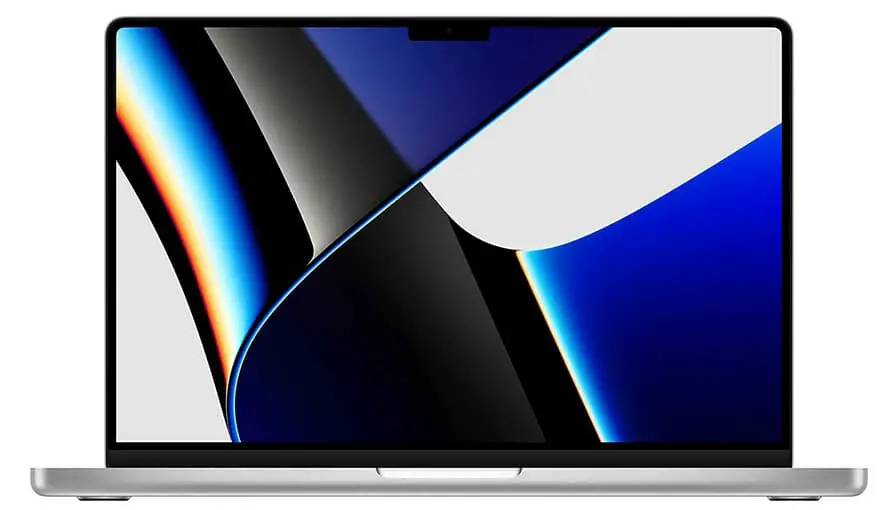
MacBook Pro 14-inch (M1 Pro)
Portable yet powerful, the M1 Pro chip offers remarkable performance and extended battery life. Perfect for programmers on the go.
Check the latest deal price on Amazon for the Apple MacBook Pro 14″.
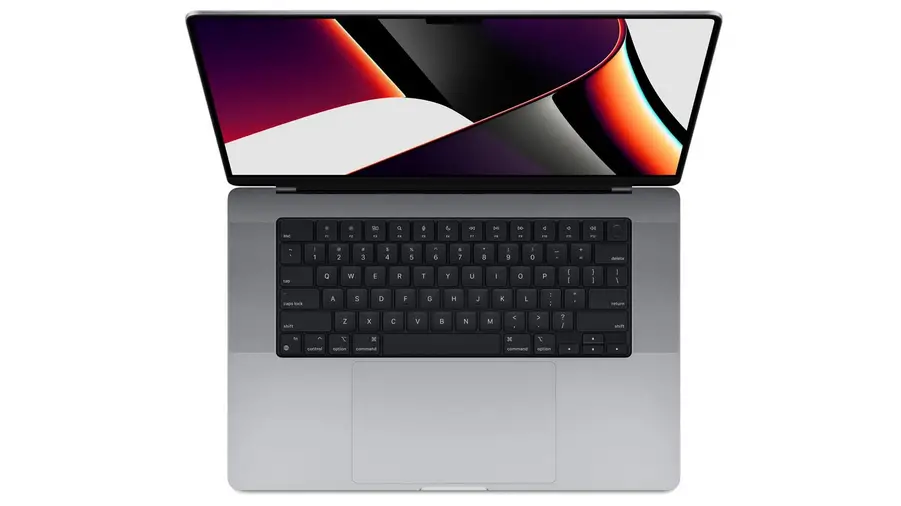
MacBook Pro 16-inch
Powerful and reliable, with a generous display and ample storage options. Ideal for resource-intensive tasks and multitasking.
Check the latest price on Amazon
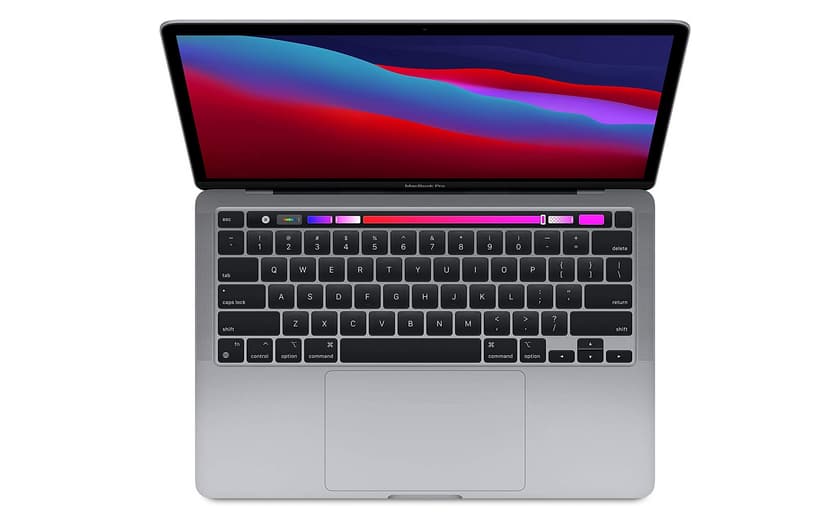
MacBook Pro 13-inch (M1)
Ultra-portable with impressive battery life, suitable for programmers prioritizing mobility, and a lightweight design.
Check the latest deal price on Amazon for the Apple MacBook Air 13″.
From larger displays for enhanced productivity to portable devices for developers on the go, Apple offers a range of MacBook models suitable for programming tasks.
This section explores three categories of MacBook laptops: large displays (15 and 16 inch), portable devices (14 inch), and compact devices (13 inch).
Within each category, I highlight the best MacBook laptop and the reasons why it is well-suited for programming, providing you with valuable insights to make an informed decision.
I. Large Display MacBooks (15-inch and 16-inch)
MacBooks with larger displays are favored by programmers who require ample screen real estate for multitasking, working with complex codebases, and running resource-intensive applications.
Best 16-inch MacBook for Programming: MacBook Pro 16-inch

The MacBook Pro 16-inch stands out as an excellent choice for programming due to its impressive combination of power and performance.
Here’s why it excels:
- Generous Display: The 16-inch Retina display provides ample space for coding, debugging, and viewing multiple windows simultaneously.
- Powerful Processing: Equipped with high-performance Intel processors, the MacBook Pro 16-inch offers seamless multitasking and smooth execution of resource-intensive tasks.
- Ample Storage: The MacBook Pro 16-inch provides large storage options, allowing programmers to store extensive code repositories and datasets without compromising speed.
- Enhanced Cooling: The improved thermal design of the MacBook Pro 16-inch ensures efficient heat dissipation during demanding coding sessions.
Check the latest price of Apple MacBook Pro 16-inch on Amazon.
II. Portable MacBooks (14 inch laptops)
For developers who prioritize portability without compromising performance, MacBook laptops with 14-inch displays strike a balance between mobility and productivity.
Best 14-inch MacBook for Programming: MacBook Pro 14-inch (M1 Pro)

The MacBook Pro 14-inch powered by Apple’s M1 Pro chip is an exceptional choice for programmers seeking portability and power.
Here’s what makes it stand out:
- Portable Form Factor: The 14-inch display strikes a balance between screen size and portability, making it ideal for developers who work on the move.
- Impressive Performance: The M1 Pro chip, designed specifically for the MacBook Pro, delivers remarkable speed and efficiency for compiling code, running virtual machines, and handling demanding development tasks.
- Extended Battery Life: The M1 Pro chip’s energy efficiency enables the MacBook Pro 14-inch to offer extended battery life, ensuring productivity throughout the day.
- Unified Memory Architecture: The M1 Pro’s unified memory architecture enhances performance by enabling seamless data access and sharing between the processor and graphics.
Check the latest deal price on Amazon for the Apple MacBook Pro 14″.
III. Compact Apple MacBooks (13 inch)
For programmers seeking a lightweight and compact MacBook that doesn’t compromise on power, the 13-inch models are a popular choice.
Best 13-inch MacBook for Programming: MacBook Pro 13-inch (M1)

The MacBook Pro 13-inch powered by Apple’s M1 chip strikes an excellent balance between performance and portability.
Here are the key reasons why it is well-suited for programming:
- Compact and Lightweight: The 13-inch form factor makes it highly portable, allowing programmers to code on the go without sacrificing screen space.
- Impressive Processing Power: The M1 chip delivers exceptional performance and efficiency, handling coding tasks swiftly and smoothly.
- Extended Battery Life: The M1 chip’s energy efficiency translates into remarkable battery life, enabling longer coding sessions without the need for frequent recharging.
- Excellent Software Compatibility: The transition to Apple Silicon has been seamless for many software tools, ensuring compatibility with popular coding environments, libraries, and frameworks.
Check the latest deal price on Amazon for the Apple MacBook Pro 13″.
Another great compact MacBook that is still a suitable choice for programmers is the MacBook Air M1 laptop.
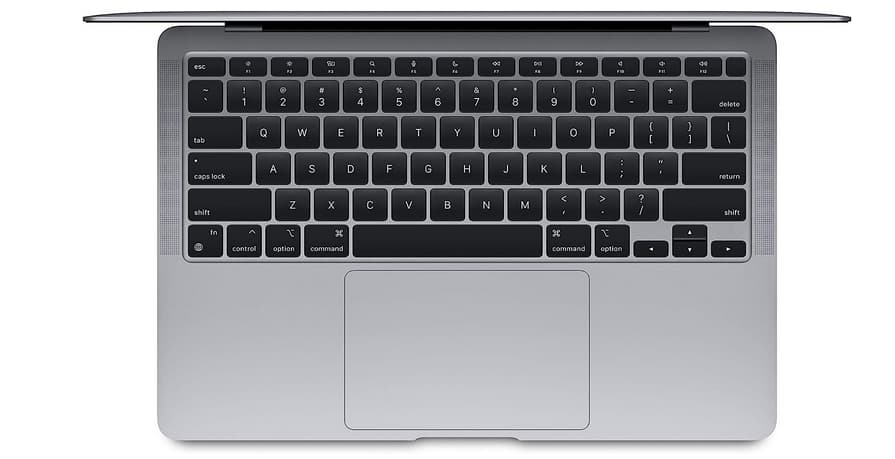
While it may not offer the same level of performance as the MacBook Pro models, it still presents a viable option for certain programmers who prioritize lightweight and compact laptops.
The MacBook Air with Apple’s M1 chip is an attractive choice for programmers seeking a balance between portability and performance.
Here’s why it is worth considering:
- Ultra-Portable Design: The MacBook Air is incredibly thin and lightweight, making it highly portable and convenient for developers who are frequently on the move.
- Energy Efficiency: The M1 chip’s energy efficiency provides impressive battery life, allowing for extended coding sessions without the need for frequent charging.
- Solid Performance: Despite its slim profile, the M1 chip delivers impressive performance, handling coding tasks with ease and efficiency.
- Silent Operation: The MacBook Air’s fanless design ensures quiet operation, minimizing distractions and creating a peaceful coding environment.
Check the latest deal price on Amazon for the Apple MacBook Air 13″.
FAQs
Is a MacBook better than a gaming laptop for coding?
A MacBook can be a better choice than a gaming laptop for coding due to its optimized software ecosystem, Unix-based system, and seamless integration of hardware and software.
MacBooks excel in stability, security, and reliability, providing a user-friendly environment for coding tasks. While gaming laptops may offer more powerful hardware, MacBooks offer a refined coding experience with extensive development tools and a robust operating system.
Can you code Python on a MacBook?
Certainly! MacBook is an excellent platform for coding in Python. You can easily install it on your MacBook. The Unix-based system provides a reliable development environment that supports a variety of code editors and integrated development environments (IDEs) where you can write, debug, and execute Python code.
Moreover, if you prefer a lightweight option, you can utilize IDLE, the default Python IDE that comes with the Python installation. MacBook’s compatibility with Python libraries and frameworks makes it a popular choice among Python developers.
What programming language do programmers who use Apple use most?
The programming language most commonly used by programmers who use Apple is Swift. Swift was developed by Apple and has gained popularity due to its modern syntax, safety features, and seamless integration with Apple’s software ecosystem. It is the primary language for developing applications for iOS, macOS, watchOS, and tvOS, making it the top choice for Apple-focused programmers.
Which MacBook is best for Python coding?
The MacBook Pro 14-inch (M1 Pro) is an excellent choice for Python coding. Its powerful M1 Pro chip offers exceptional performance, while its portable form factor ensures convenience. With impressive processing capabilities and an optimized software ecosystem, it provides an ideal platform for Python development.
Is Python paid on MacBook?
Python is not paid on MacBook. Python is an open-source programming language that is free to download, install, and use on any operating system, including macOS. MacBook users can freely utilize Python for coding and development without any additional costs, making it a popular choice for Python programming.
Is a MacBook Air good for programming?
Yes, the MacBook Air is a good option for programming, especially for those on a budget. With its sleek design, portability, and energy-efficient M1 chip, it offers solid performance for coding tasks. While it may not match the power of Pro models, its affordability and lightweight design make it an attractive choice for programmers seeking a budget-friendly and highly portable MacBook.
Is MacBook good for web development?
Yes, MacBooks are excellent choice for web development. Their reliable performance, intuitive interface, and vast selection of web development tools make them ideal for coding websites and web applications.
MacBooks excel in graphic-intensive tasks, enabling smooth design and front-end development. Additionally, for advanced web apps involving machine learning integration, MacBooks development environments offer compatibility with popular ML frameworks and tools. Overall, MacBooks provide a robust and user-friendly platform for web development, empowering developers to create innovative and visually appealing web experiences.
Conclusion
MacBooks have established themselves as a preferred choice for software engineers and web developers for a multitude of reasons.
Their Unix-based system, access to tools like the Terminal, and seamless integration of hardware and software create a reliable and versatile coding environment.
MacBooks offer a range of opportunities, from developing software for the Apple ecosystem to leveraging the power of Unix-like environments for coding.
The different MacBook models cater to various needs, with larger displays for enhanced productivity, portable devices for developers on the go, and compact options for those seeking a lightweight solution.
Whether you are a web developer, software engineer, or coding enthusiast, choosing a MacBook provides you with a robust platform that simplifies web development tasks, enables graphic-intensive projects, and offers compatibility with emerging technologies like machine learning.
Embrace the power of MacBooks and unlock your potential to create innovative and impactful web and software solutions.
Create, inspire, repeat!

